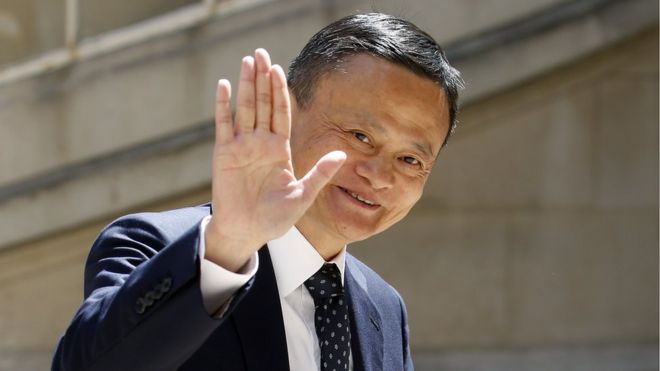Jack Ma steps down as Alibaba’s chairman. He totally represents the Chinese dream’s view. Ma will still continue to be a big influence over the company he has founded. “Don’t forget about dreams” he said
When Alibaba’s founder Jack Ma said last September that within one year he was going to hand over his role to chief executive Daniel Zhang and step away from managing the e-commerce giant he created, the announcement came as a surprise. And the reason was simple. For 20 years, Jack Ma has been the face of Alibaba.Video Player00:0003:19
Yesterday Ma, announced his retirement in front of over 60 thousand Alibaba’s employees at an Olympic-sized sports stadium in Hangzhou, during Alibaba’s 20th anniversary party. In a video posted on Monday on company’s official Twitter page, Ma said: “I’m the person always looking forward. I don’t want to look at the things back.” Ma, a former English teacher, has previously said he will turn his attention to philanthropy, focusing on education in rural areas.
Jack Ma’s story has inspired a legion of tech entrepreneurs in China. He is actually the true example of Chinese dream.
Since its founding in 1999, under Jack Ma’s guidance, Alibaba has become the e-commerce leader in China, and one of worldwide tech giant, able to challenge US big tech such as Amazon and Facebook. Alibaba has gone from being a traditional e-commerce company to a conglomerate that has businesses from logistics to food delivery and cloud computing.
Everything started 20 years ago in one building in Hangzhou. The legend says that Alibaba was established by a group of 18 founders led by the former English teacher Jack Ma. The group worked out of Ma’s apartment in Hangzhou, where Alibaba is now headquartered. But the new-born Alibaba’s path was not easy. As Jack Ma reminded “After one year we were almost near to fail as company”.

©Alibaba. January 2000: SoftBank invests. Jack Ma and Masayoshi Son shake hands after the Japanese conglomerate led a $20 million funding round into the company.
After the refuse of Chinese main banks to believe in Alibaba, Mr. Ma has flown to Japan, meeting Masayoshi Son. It was a second beginning: Alibaba got a $20 million investment from SoftBank, one of biggest Japan based conglomerate. After that first meeting, Jack Ma and Masayoshi Son established a real and mutual respectful friendship. “Jack Ma arrived without a real business plan or revenue. His company was almost near to close. But we talked about dreams, shared vision and I liked the life and light in his eyes”, said SoftBank CEO Masayoshi Son about Jack Ma.
After 20 years, Alibaba is now a company valued over $460 billion. Alibaba is everywhere, not only as e-commerce platform. For example its financial affiliate Ant Financial is one of two dominant mobile payments providers in China. From Japan to Mexico, Alipay logo is available in any shop. Moreover, the company has diversified into businesses such as music and entertainment.
Combining these business models with e-commerce. As we know, it has developed its New Retail concept of combining both online and offline shopping experiences. Then, earlier this year the company unveiled its first self-developed chip processor, amid a call from Beijing for the country to attain greater self-sufficiency in semiconductors.
So, is Jack Ma really ready to “enjoy the life as Forrest Gump?”. The answer is not yet. Ma is not severing ties altogether.
As stated by Hangzhou based e-commerce giant, he will stay on Alibaba’s board of directors until the annual shareholders meeting in 2020, plus, he will remain a lifetime partner in the Alibaba Partnership, a small group of senior executives and top managers with the rights to nominate a majority of the directors on the company’s board.
So, what’s next? Alibaba is facing several challenges. Amid US-China trade war and a slowing Chinese economy, Hangzhou based tech giant battles more competition from other large domestic tech firms such as Pinduoduo and JD, both best e-tailer in lower tier cities that expected to be the next drivers of growth for Chinese consumption.

©Pinduoduo. Although Taobao and JD.com are still the e-commerce market leaders, Pinduoduo is the app that benefits from the highest loyalty rate.
Then, Alibaba is trying to become a real international company and the first step was the acquisition of Lazada, main SEA e-commerce platform. Second, Jack Ma is deeply convinced to invest in cross-border e-commerce. In this framework, Alibaba has acquired NetEase Kaola for $2 billion creating the largest cross-border e-commerce platform in China with more than 50% of the market.
While Alibaba gears up to tackle a new era of consumption, do you really think Jack Ma wants to focus all his energies on education and philanthropic efforts rather than business? Nevertheless Jack Ma won’t suddenly disappear, he will still be one of the faces of the company despite not having a formal role.






You must be logged in to post a comment.